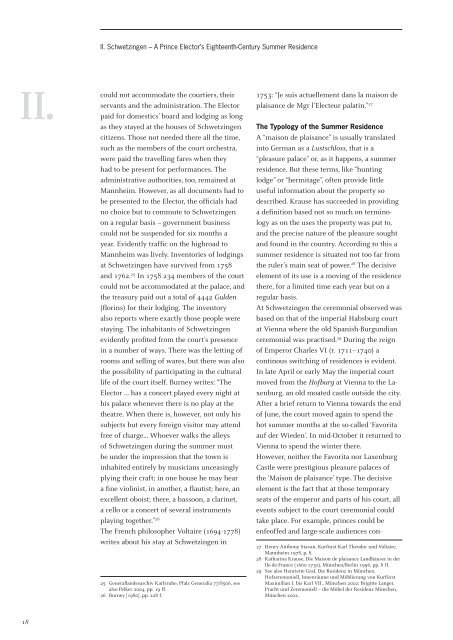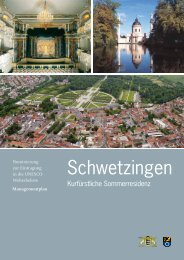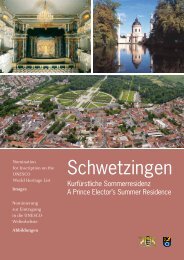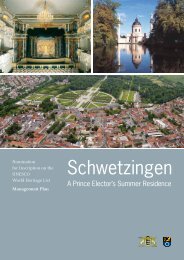II. - Schloss Schwetzingen
II. - Schloss Schwetzingen
II. - Schloss Schwetzingen
You also want an ePaper? Increase the reach of your titles
YUMPU automatically turns print PDFs into web optimized ePapers that Google loves.
<strong>II</strong>.<br />
18<br />
<strong>II</strong>. <strong>Schwetzingen</strong> – A Prince Elector’s Eighteenth-Century Summer Residence<br />
could not accommodate the courtiers, their<br />
servants and the administration. The Elector<br />
paid for domestics’ board and lodging as long<br />
as they stayed at the houses of <strong>Schwetzingen</strong><br />
citizens. Those not needed there all the time,<br />
such as the members of the court orchestra,<br />
were paid the travelling fares when they<br />
had to be present for performances. The<br />
administrative authorities, too, remained at<br />
Mannheim. However, as all documents had to<br />
be presented to the Elector, the offi cials had<br />
no choice but to commute to <strong>Schwetzingen</strong><br />
on a regular basis – government business<br />
could not be suspended for six months a<br />
year. Evidently traffi c on the highroad to<br />
Mannheim was lively. Inventories of lodgings<br />
at <strong>Schwetzingen</strong> have survived from 1758<br />
and 1762. 25 In 1758 234 members of the court<br />
could not be accommodated at the palace, and<br />
the treasury paid out a total of 4442 Gulden<br />
(fl orins) for their lodging. The inventory<br />
also reports where exactly those people were<br />
staying. The inhabitants of <strong>Schwetzingen</strong><br />
evidently profi ted from the court’s presence<br />
in a number of ways. There was the letting of<br />
rooms and selling of wares, but there was also<br />
the possibility of participating in the cultural<br />
life of the court itself. Burney writes: “The<br />
Elector ... has a concert played every night at<br />
his palace whenever there is no play at the<br />
theatre. When there is, however, not only his<br />
subjects but every foreign visitor may attend<br />
free of charge... Whoever walks the alleys<br />
of <strong>Schwetzingen</strong> during the summer must<br />
be under the impression that the town is<br />
inhabited entirely by musicians unceasingly<br />
plying their craft; in one house he may hear<br />
a fi ne violinist, in another, a fl autist; here, an<br />
excellent oboist; there, a bassoon, a clarinet,<br />
a cello or a concert of several instruments<br />
playing together.” 26<br />
The French philosopher Voltaire (1694-1778)<br />
writes about his stay at <strong>Schwetzingen</strong> in<br />
25 Generallandesarchiv Karlsruhe, Pfalz Generalia 77/8506, see<br />
also Pelker 2004, pp. 19 ff.<br />
26 Burney [1980], pp. 228 f.<br />
1753: “Je suis actuellement dans la maison de<br />
plaisance de Mgr l’Electeur palatin.” 27<br />
The Typology of the Summer Residence<br />
A “maison de plaisance” is usually translated<br />
into German as a Lustschloss, that is a<br />
“pleasure palace” or, as it happens, a summer<br />
residence. But these terms, like “hunting<br />
lodge” or “hermitage”, often provide little<br />
useful information about the property so<br />
described. Krause has succeeded in providing<br />
a defi nition based not so much on terminology<br />
as on the uses the property was put to,<br />
and the precise nature of the pleasure sought<br />
and found in the country. According to this a<br />
summer residence is situated not too far from<br />
the ruler’s main seat of power. 28 The decisive<br />
element of its use is a moving of the residence<br />
there, for a limited time each year but on a<br />
regular basis.<br />
At <strong>Schwetzingen</strong> the ceremonial observed was<br />
based on that of the imperial Habsburg court<br />
at Vienna where the old Spanish-Burgundian<br />
ceremonial was practised. 29 During the reign<br />
of Emperor Charles VI (r. 1711–1740) a<br />
continous switching of residences is evident.<br />
In late April or early May the imperial court<br />
moved from the Hofburg at Vienna to the Laxenburg,<br />
an old moated castle outside the city.<br />
After a brief return to Vienna towards the end<br />
of June, the court moved again to spend the<br />
hot summer months at the so-called ‘Favorita<br />
auf der Wieden’. In mid-October it returned to<br />
Vienna to spend the winter there.<br />
However, neither the Favorita nor Laxenburg<br />
Castle were prestigious pleasure palaces of<br />
the ‘Maison de plaisance’ type. The decisive<br />
element is the fact that at those temporary<br />
seats of the emperor and parts of his court, all<br />
events subject to the court ceremonial could<br />
take place. For example, princes could be<br />
enfeoffed and large-scale audiences con-<br />
27 Henry Anthony Stavan, Kurfürst Karl Theodor und Voltaire,<br />
Mannheim 1978, p. 8.<br />
28 Katharina Krause, Die Maison de plaisance Landhäuser in der<br />
Ile-de-France (1660-1730), München/Berlin 1996, pp. 8 ff.<br />
29 See also Henriette Graf, Die Residenz in München.<br />
Hofzeremoniell, Innenräume und Möblierung von Kurfürst<br />
Maximilian I. bis Karl V<strong>II</strong>., München 2002; Brigitte Langer,<br />
Pracht und Zeremoniell – die Möbel der Residenz München,<br />
München 2002.






